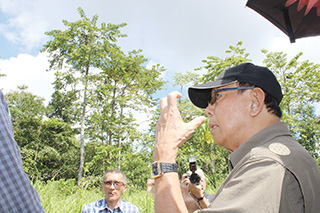YSD and SFD claim success
Published on: Friday, December 09, 2016

Lahad Datu: Yayasan Sime Darby (YSD) and Sabah Forestry Department (SFD) have claimed success in their joint reforestation of orang-utan habitat in Northern Ulu Segama. Once "rare" and "decreasing" sighting of the orang-utan has now become "common" in the 5,400-hectare Bukit Piton Forest Reserve in Ulu Segama that was repeatedly whacked by severe logging and forest fires since the 1960s. The decisive game changer is an unusually large sum of cash worth RM25 million pumped in by Sime Darby Foundation, which imposed high standard corporate reforestation techniques in collaboration with the Sabah Forestry Department since 2009, focused primarily on recreating orang-utan habitats which also help other wildlife simultaneously.
ADVERTISEMENT
"I am pleased to see that the project has borne fruit, and we have achieved what we have set out to do – to provide trees for the orang-utan population," said Tun Musa Hitam, Chairman of Yayasan Sime Darby, who visited the project site for the first time on December 7 since its inception in 2009.Since then, 4,724 hectares had been rehabilitated with 350,000 seedlings of numerous species of indigenous dipterocarps and pioneer trees that secured 90 per cent survival rate. "We are proud of this success," said Musa, who told Daily Express he believes in admitting mistakes frankly and acting seriously on fixing those mistakes. Typical of Musa, he spared no one including criticising his own government for "rape" of Malaysia's forests in his heydays as Primary Industries Minister in charge of forests in the 1970s."I think this success story in Sabah is something of interest to the world, we have been attacked over the orang-utan.
ADVERTISEMENT
I know our weaknesses, that we have committed mistakes but now we are putting our acts together and making it work," he said. "We slogged it out, started our Corporate Social Responsibility focused on wildlife quietly.
ADVERTISEMENT
Now 8 to 9 years later, we are happy we are ahead and what we started on orang-utan rehabilitation is now proven. And I would like to tell the world: Look, we have been doing the right thing because we walked the talk, not cakap cakap," he told a press conference in Ula Segama on Wednesday. Now that the Foundation had proven beyond doubt that healing of acutely damaged forests can be done, Musa encouraged the many other plantation companies involved in Sabah to copy the Yayasan Sime Darby CSR. "Let's do something about it. Sime Darby Foundation can accommodate, I am sure the Forestry Department will do the same," Musa added. "In the old days, one could accuse that Sabah was one of the biggest states that exploited the wealth of our timber and became a major exporter of our timber and, of course, it can be said 'unintentionally maybe we have destroyed the forests'." "The good news is that since I became the Chairman of Sime Darby Foundation, I realised that the Sabah Government is very, very positive on rehabilitation, the value of preservation and promotion of wildlife. And in order to justify in even in monetary terms, I realise that these things in themselves are money-making exercises in the long run, for instance becoming very popular eco-tourism," Musa said.For instance, the 5,400ha Bukit Piton Forest Reserve forms just a fraction of the 242,884ha Sabah Government initiative called Ulu Segama-Malua Sustainable Forest Management project established on March 15, 2006. Meanwhile, Sabah Conservator of Forest, Datuk Sam Mannan, described Musa's maiden visit to Bukit Piton as "excellent"."We need more people like that because it shows their commitment and their support to make things happen in the interest of conservation. It is very rare to find somebody like him who gives his full commitment and comes to have a look himself on the situation on the ground to get a better perspective of what it's all about and to continue support," Mannan said. Musa had pledged "sustained interest" in Bukit Piton beyond 2018 when the project matures maybe in the form of postgraduate scholarships to study the movement and behaviour of orang-utan in this newly-developed area. Asked how does the visit help this project, Mannan said: "Well, he is the one who has to approve finally the payment with the rest of the Board and he wants to see for himself whether the money is well spent and whether it is achieving the targets that have been set and he can see now that actually we have that measure of success – certified well done by the man himself," Mannan noted. Asked about his own opinion of the Bukit Piton project, he said: "This is excellent, this is the first time we have such a high standard of techniques in restoring forests and how we have learnt from the corporate field on how work should be done in an efficient manner following the discipline of the private sector."By high standard of techniques in restoring forests, I mean attention to details , for, example, site species matching, handling of seedlings and field transportation, hardening of seedlings prior to field planting, proper planting and shade manipulation, weeding regularly, etc.," Mannan elaborated.On learning from the corporate field how work should be done in an efficient manner and discipline, Mannan said: "This involves where resources should be allocated and when, payment on the basis of results, such as productivity, survival rates. For instance, a project can achieve up to 90pc or more survival against 75-80pc normally, regular monitoring and immediate actions to address issues, not waiting to solve problems." "My point always is whenever I go around the world to give talks, I always say to them: "You can forget completely what I have said but not one thing: If the orang utan is going to survive as a species, it has the greatest chance in Sabah because of the work that is going on," Mannan said. Stay up-to-date by following Daily Express’s Telegram channel.
Daily Express Malaysia




